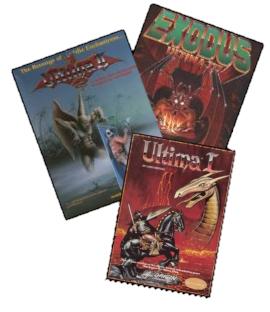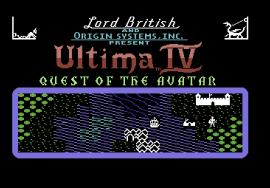
|

 Classic Game Spotlight:
Classic Game Spotlight:Ultima During the 1980s and early 1990s, the Ultima games were consistently at the forefront of computer role playing game development. Lead designer Richard Garriott programmed the first Ultima while still in University and sold the games packaged in plastic zip-loc bags. Over the years, Ultima grew into one of the most successful and influential game series of all time and lead to Garriott’s 2006 induction into the Academy of Interactive Arts and Sciences Hall of Fame.  The Story The StoryThe story of Ultima follows the player, a human from our time, who is summoned to the world of Britannia through a magical gate. There he meets the benevolent ruler “Lord British” (who was actually designer Richard Garriott’s alter ego) and is sent on a quest to overcome various challenges that face the land and its people. The first three games in the series were stereotypical “good-vs-evil” stories. In each case, the player had to explore the land, slay monsters, gain experience, find better weapons, and eventually face and defeat the ultimate bad guy in his or her castle. Each game grew in scope and complexity, and their continued success eventually lead to the creation of Origin Systems, Richard Garriott’s own game production company.  The Avatar The AvatarThe game’s story took a radical turn with 1985's release of Ultima IV: Quest of the Avatar. Not content with another “slay-the-wizard” storyline, Garriott began to experiment with a gameplay system that could incorporate morals, ethics, and complex decisions. The story of Ultima IV did not contain an ultimate bad guy, but rather saw the player mastering eight virtues (including such abstract notions as compassion, humility, and spirituality) to become the “Avatar” and lead the people of Britannia into a new age of enlightenment. We spoke to Garriott at the 2006 Game Developer’s Conference about the game’s development. Given its lofty goals and complete departure from the tried-and-true, Garriott was understandably nervous about the success of his latest creation. The game, however, had an incredibly positive reception, making many “Best Of” lists over the years, and even receiving the #2 spot in Computer Gaming World’s “Best Games of All Times”.  Garriott continued to explore complex themes in subsequent chapters. Ultima V: Warriors of Destiny (1988) dealt with fundamentalism and the mis-interpretation of virtue, while Ultima VI: The False Prophet (1990) revolved around racism and prejudice. The series’ continued success proved that games could paint more than simple black-and-white pictures. Garriott continued to explore complex themes in subsequent chapters. Ultima V: Warriors of Destiny (1988) dealt with fundamentalism and the mis-interpretation of virtue, while Ultima VI: The False Prophet (1990) revolved around racism and prejudice. The series’ continued success proved that games could paint more than simple black-and-white pictures.... Continued on the next page ... 
|
